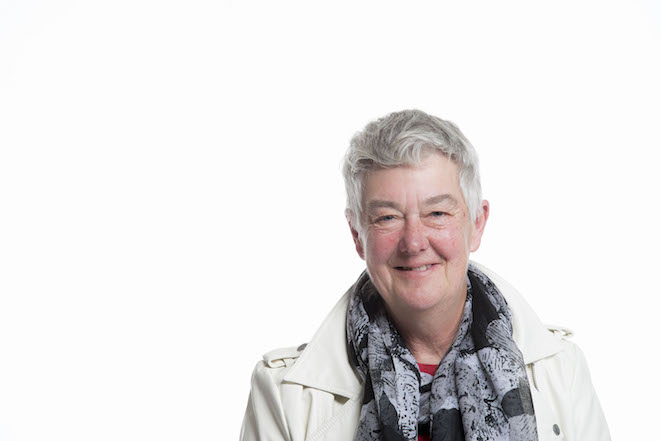- Details
- Published: 17 August 2015
By Dr. Claire Robson
Older lesbian, gay, bisexual, and transgender (LGBT) adults are often an invisible population, as stigma and isolation keep them ‘stuck in the closet'. They may be at increased risk for elder abuse, neglect, and exploitation, since research shows that they are more likely to live alone, less likely to be partnered, and less likely to have children, or if they do, to find them supportive. If LGBT individuals do experience abuse, shame and a desire to be seen as ‘normal’ may make them reluctant to report it. Our project addresses these concerns in an innovative way: an intergenerational arts project and collaboration between LGBT elders and youth to raise societal awareness of LGBT elder abuse, and provide information about services.
Gloria Gutman called me up to her office in Simon Fraser University’s Department of Gerontology back in late December 2014 to brainstorm ideas about how we could increase awareness of LGBT elder abuse, both within the LGBT community and among people who provide elder abuse services. As a community artist, I believe strongly in the power of collective art-making as a way to create social change, so I pitched the idea of a collaborative arts project that would produce materials that could then be disseminated. We assembled a group of community partners - the Alzheimer’s Society of BC, Haro Park Centre, the Health Initiative for Men, Vancouver Coastal Health’s ReACT Adult Protection Program and the elder abuse leads from each of the other four health authorities in BC, as well as QMUNITY and the West End Seniors’ Network. In January 2015, Gloria made a successful application for funding from the Council to Reduce Elder Abuse.
Our intergenerational team is drawn from two existing groups. The first is the Queer Imaging & Riting Kollective for Elders (aka Quirk-e), an arts collective that meets in Britannia Services Centre, and the second is Youth for a Change, a group of young activists and educators that meets in Surrey. The two groups collaborated on an intergenerational show in 2014, and have established trust and clear ways of working together. The project is facilitated by Kelsey Blair, who has a background in theatre and is currently a Quirk-e co-facilitator as well as a doctoral student at SFU.
Kelsey began by inviting in speakers, including Gloria, to educate the team about elder abuse. Jen Marchbank, facilitator of Youth for a Change, and a faculty member of the Department of Gender, Sexuality and Women’s Studies at SFU, contributed materials on the ways that it might play out differently, as well as similarly, in the LGBT population. During this initial phase of the project, we also held a community consultation that included our partners and other local individuals and organizations, as we sought input, stories, and first-hand accounts.
Next, Kelsey engaged the team in a significant challenge – how to turn everything they’d learned into clear, cogent fact sheets and videos. Firstly, they talked together about who, exactly, should be represented. For instance, what might abuse look like for a transsexual person in residential care, or an older lesbian couple with homophobic children, or an older man with a much younger partner? Secondly, what scenarios, images and texts might represent these experiences most effectively with the resources available? The learning in the two groups has been immense, as they’ve navigated themselves through these choices, which are artistic as well as philosophical and political. Not only do they have increased knowledge of the problem of elder abuse, but they’ve also learned to make strong artistic decisions, and received an excellent introduction to the nuts and bolts of filming and design.
Once the fact sheets and videos are completed, the project will go on tour across BC. Teams of elders and youth will travel to BC’s five health regions to show the videos, distribute the fact sheets, make presentations, and answer questions. These Town Hall-type sessions will be open to all. We hope that caregivers and key stakeholders, both within and outside the adult and youth LGBTQ communities, will attend, so that we can create greater awareness of elder abuse, prevention, and services and increase sensitivity to the needs of LGBT older adults. Training materials will be posted on the SFU Gerontology Research Centre’s website and will be free of charge to any organizations and individuals that wish to use them.
For more information about the project, or to find out about the upcoming meetings, contact Dr. Gloria Gutman at .
 Dr. Claire Robson facilitates Quirk-e – the queer imaging & riting collective for elders and co-organizes BOLDFest, a conference for lesbian elders. Her federally funded postdoctoral research at Simon Fraser University investigated the potential of arts-engaged community practices. A widely published writer of fiction, memoir, and poetry, Claire’s most recent book, Writing for Change, shows how collective memoir writing can effect social change. Her awards include Xtra West Writer of the Year, the Joseph Katz Memorial Scholarship (for her contributions to social justice), and the Lynch History Prize (for her contributions to better understanding of gender and sexual minorities).
Dr. Claire Robson facilitates Quirk-e – the queer imaging & riting collective for elders and co-organizes BOLDFest, a conference for lesbian elders. Her federally funded postdoctoral research at Simon Fraser University investigated the potential of arts-engaged community practices. A widely published writer of fiction, memoir, and poetry, Claire’s most recent book, Writing for Change, shows how collective memoir writing can effect social change. Her awards include Xtra West Writer of the Year, the Joseph Katz Memorial Scholarship (for her contributions to social justice), and the Lynch History Prize (for her contributions to better understanding of gender and sexual minorities).

















